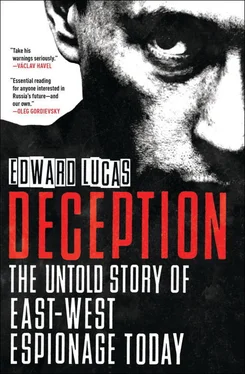Another use for Simm concerned Estonia’s help for Georgia and Ukraine, which for much of the last decade had hopes of joining NATO. The alliance was publicly cautious about their chances, which eventually flopped at a disastrous NATO summit in Bucharest in 2008. But a strong lobby in America had tried hard to boost their chances, not least by helping them reorganise their defence, security and intelligence services along Western lines. It soon became clear that advice from Estonia (and to some extent the other Baltic states) was particularly effective. American and British advisers knew the theory, but not the practice. Estonia had first-hand experience in judging which parts of Soviet administration were incorrigible, and which could be successfully transformed. An influential cabal of advisers in Georgia gained the nickname of the ‘Estonian kitchen’, after a senior Russian official complained publicly ‘we know this kitchen’. Russia could not stop the burgeoning cooperation between Tallinn and Tbilisi. But thanks to Simm it knew a lot about it.
Simm was also useful in keeping an eye on the relationship between Estonia’s intelligence agency and its NATO counterparts. The most sensitive operations were run on a purely bilateral basis. But NATO wish lists and some intelligence obtained did cross Simm’s desk. Clearly, the SVR was thrilled with their agent. As well as receiving a medal in 2006, Simm also met a senior officer – he believes a deputy director – of the SVR, in a carefully staged meeting in the western Czech spa town of Karlovy Vary. The two men walked in a park together, with Antonio keeping a discreet distance. This is standard practice in Russian spycraft when a source becomes particularly important: it allows the service to be sure that the case officer has indeed recruited the person he claims, and provides a check against embellishment, or the use of a double agent.
But long-term espionage operations, when successful, contain the seeds of their own destruction. Information obtained must be used, or the effort to obtain it is pointless. And using it creates clues for the other side. If you regularly see your opponent is forewarned, you wonder why and start taking measures to plug the leak. Simm’s case was no exception.
Indeed unease had been growing for years in Western capitals about Russian penetration of NATO. Initially, at the end of the Cold War, the guard had dropped. The prospect of a Soviet conventional assault on Western Europe, giving a few panicky days to decide between nuclear war and surrender, had shaped thinking for a generation, but with the military threat gone, and Russian forces in retreat from their former empire, thinking about security relaxed. That led to blunders – for example in the NATO operation in Yugoslavia in 1998, when a French officer at the alliance’s HQ, Pierre-Henri Bunel, leaked its military plans to Belgrade (and was jailed for it). As NATO tried to befriend Russia and treat it as a partner, it became easier for Russian spies to pitch to NATO officials: passing on a bit of information was no longer treason, it was just oiling wheels that were already turning. Russian espionage attempts played skilfully on jealousies and rivalries within the alliance. Some of those recruited by the Russians resigned quietly when caught, rather than face prosecution: nobody at the top in NATO wanted to seem too hawkish or provocative when the message from their political masters was to promote reconciliation and trust. That was annoying for NATO’s spycatchers. So too was the difficulty of screening officials from new members of the alliance (though attention focused on countries such as Hungary and Bulgaria, rather than the Estonians, who were seen as star pupils). But more troubling than all this were the agents the spycatchers could not find. Russia was clearly devoting considerable resources to penetrating the alliance, at a time when NATO’s counter-intelligence services had neither the capability, nor the political backing, to deal with it.
Similar worries were soon to be felt even more sharply at the top of British and American security establishments. Western human and electronic sources inside the Russian defence and security establishment suggested that huge quantities of documents, as well as details of cryptographic security and of high-level policy discussions on issues such as cyber-warfare and missile defence, were making their way into Russian hands. This was far more than the piecemeal collection of small leaks, gossip and chance disclosures that could be expected from normal espionage activity: the explanation could only be a major breach. Close scrutiny of the evidence suggested that the leak was in some way connected with the Baltic states. The finger of suspicion pointed either at a senior official in the region, or to one posted to Brussels. At the same time Western intelligence appears to have had a separate lucky break, recruiting a source in the heart of the SVR, closely involved in the illegals programme. The information was initially fragmentary and incomplete. But it still marked a breakthrough – the biggest, perhaps, since Vasily Mitrokhin’s archive – in finding Russia’s most elusive spies in the West. The spycatchers’ net was beginning to close at two ends: one around the blundering Antonio and his colleagues, and the other around the disgruntled Simm.
At this stage, Western spy chiefs took no action. It was more important to identify the leak than to try to catch the traitor. Once they knew the person or people involved, the time would then come to decide whether to prosecute, to hush the matter up, or to try some ruse in return. This reflects a paradoxical feature of counter-intelligence: that the seemingly most difficult business, of identifying a suspected spy, is in practical terms the least demanding. Collecting the evidence, especially if a prosecution is planned, is far trickier. The surveillance needs to be comprehensive but invisible, and must be conducted against targets trained to spot it. The slightest slip may end in disaster. Simm’s watchers knew that it would be all too easy for Russia to bundle their quarry into the back of a van and spirit him across the border. For MI6 to rescue Oleg Gordievsky under the noses of the KGB had been a hugely complex and risky operation. For the Russians to do the same from a Western country is easy. Antonio could board a plane from Madrid and never be seen again. Without enough evidence, you cannot stop a suspect escaping. But gathering the evidence is just what may prompt him to escape.
The spycatchers of the CIA’s counter-espionage division and a tiny group of trusted foreign partners took enormous care not to show their hand. Their aim first was to hunt down the prize catch of a Russian illegal, based on the tentative clues available. Where was he based? How had he gained his illegal identity? What was he up to? Who were his agents? Who was his controller? Would it perhaps be possible to ‘turn’ him and run him as a double agent within the SVR? Patience and subtlety would bring a reward: haste and carelessness would mean catastrophe. Then Antonio’s blunder forced the pace; the Russian’s attempt to solicit information from the Lithuanian alerted that country’s counter-intelligence service. Initially, they found the Hispanic-seeming visitor a puzzle. Was he perhaps a Western intelligence officer on an undeclared mission? Or from Israel’s Mossad? Or from China? The initial hypothesis was that he might be from the intelligence service of neighbouring Belarus. Then they observed him meeting Simm. That seemed to explain the affair: the mysterious visitor was clearly being run by those clever Estonians. But enquiries in Tallinn drew a blank. Discreetly, the Americans and Lithuanians compared notes and over a weekend in April 2008 separately briefed their Estonian counterparts: Simm, the most trusted official in the Defence Ministry, was a Russian spy.
Читать дальше












